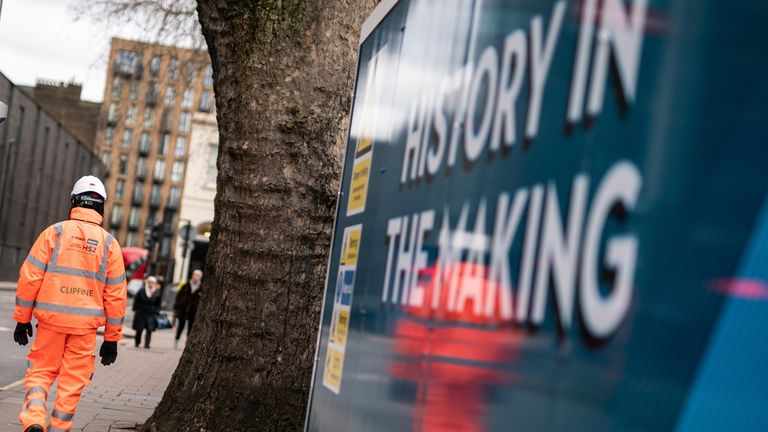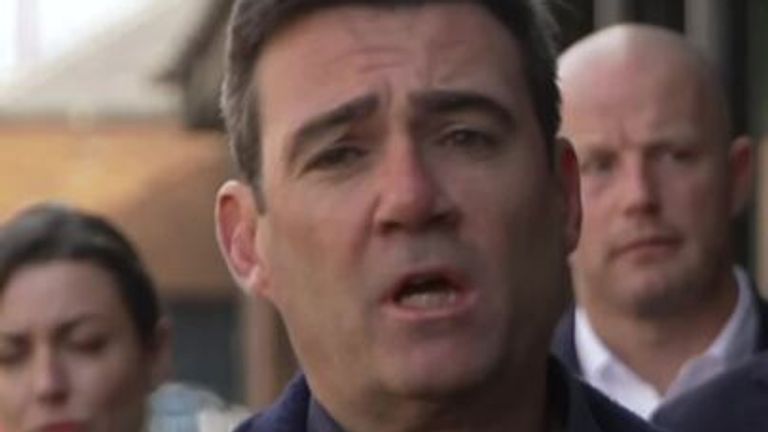
Rishi Sunak has confirmed the long-rumoured decision to scrap the northern leg of HS2 – a decision branded “wrong” by former prime minister David Cameron.
Reports the planned high speed rail line would end in Birmingham – rather than continuing up to Manchester – have been circling for weeks, with sources telling Sky News on Monday the decision had been made.
But the prime minister has spent days dodging the question, only making the announcement as he gave the closing speech to this year’s Conservative Party conference.
HS2 axe branded betrayal of the north – politics latest
Mr Cameron, who coined the phrase Northern Powerhouse alongside former chancellor George Osborne, swiftly criticised the decision, saying it was the “wrong one”.
The former prime minister said the move would “help to fuel the views of those who argue that we can no longer think or act for the long-term as a country; that we are heading in the wrong direction”.
But Mr Sunak defended the move by promising to spend the billions of cash savings on hundreds of other transport schemes across the country instead.
They will include:
• The ‘Network North’ project to join up northern cities by rail
• A ‘Midlands Rail Hub’ to connect 50 stations
• Keeping the £2 bus fare cap across the country
But a number of the projects appear to have been announced before and critics have suggested Mr Sunak is reviving schemes he was responsible for cancelling.
HS2 will still go to Euston despite suggestions it could end in the west London suburb of Old Oak Common, rather than in the centre of the capital.
PM ‘ending this long-running saga’
Speaking from a former railway station in Manchester, where the Tories’ annual event was held this year, Mr Sunak told members getting infrastructure right was key to driving growth, but a “false consensus” had emerged, with projects “driven by cities at the exclusion of everywhere else”.
He said HS2 was “the ultimate example of the old consensus”, saying the cost had doubled and the “economic case” for the line had “massively weakened with the changes to business travel post-COVID”.
The prime minister added: “I say, to those who backed the project in the first place, the facts have changed.”
“So I am ending this long-running saga. I am cancelling the rest of the HS2 project.”
Read more:
Irony of PM’s long-term vision is short-term calculation behind it – analysis
HS2 explained – what is the route and why has leg been axed?
Mr Sunak said scrapping phase two to Manchester would free up £36bn, and “every single penny” would be spent on “hundreds of new transport projects in the North and the Midlands, and across the country”.
But the government’s new “focus” would be on a project called Network North, which would “join up our great towns and cities in the North and the Midlands”.
The fully electrified line would see trains make the journey from Manchester to Hull in 84 minutes, to Sheffield in 42 minutes and Bradford in 30 minutes.
Listing other transport pledges, Mr Sunak said he would “protect” the £12bn project to link Manchester and Liverpool, build a tram in Leeds and upgrade the A1, A2, A5 and the M6.
He also promised to extend the West Midlands Metro, electrify the North Wales main line and 70 further road schemes.
‘Once in a generation opportunity lost’
Mr Cameron took aim at Mr Sunak rejecting the “consensus” that had built around HS2 and said the decision “throws away 15 years of cross-party consensus, sustained over six administrations, and will make it much harder to build consensus for any future long-term projects”.
“I regret this decision and in years to come I suspect many will look back at today’s announcement and wonder how this once-in-a-generation opportunity was lost,” he added.
Mr Cameron’s concerns were echoed by regional leaders including Greater Manchester mayor Andy Burnham, who said the HS2 announcement was “no way to treat our city when they are in our city”.
He said the government had not announced a “coherent plan” but a “transport plan patched together in hotel rooms at a party conference with no input with northern leaders or mayors”.
Mr Burnham went on to say the current plan would not solve the problem of bottlenecks and lack of capacity on the railway network in the north, which covers from Liverpool in the west to Hull in the east.
He also accused the government of failing to turn its transport pledges into reality and suggested that previous statements had been made “with political intentions in mind to try and win votes here”.
West Yorkshire Mayor Tracy Brabin called the decision “yet another betrayal of the North which will punish passengers and businesses alike”.
Mr Sunak accepted he would face criticism for the decision – having already been slammed by Tory grandees, regional politicians and businesses before the announcement was even made.
He addressed one critic in particular – the Tory mayor in the West Midlands, Andy Street – saying he was a man he had “huge admiration and respect for”, Mr Sunak added: “I know we have different views on HS2.
“But I know we can work together to ensure a faster, stronger spine: quicker trains and more capacity between Birmingham and Manchester.”
Mr Street confirmed he would not resign from his post despite being “incredibly disappointed” about the HS2 decision.
He said he had “thought incredibly long and hard about what my future in the Conservative Party should be”, but had decided to remain a member.
“The West Midlands must be at the heart of the UK’s modern transport network and reap all the benefits that will bring,” he said.
“The prime minister has today reached out to work with me to make that happen and to turn my back on that offer would be doing a serious disservice to my region.”














